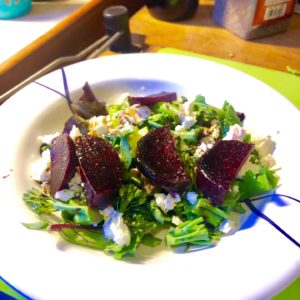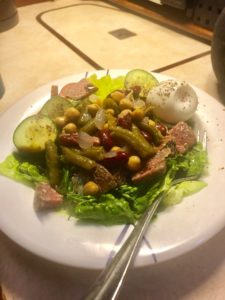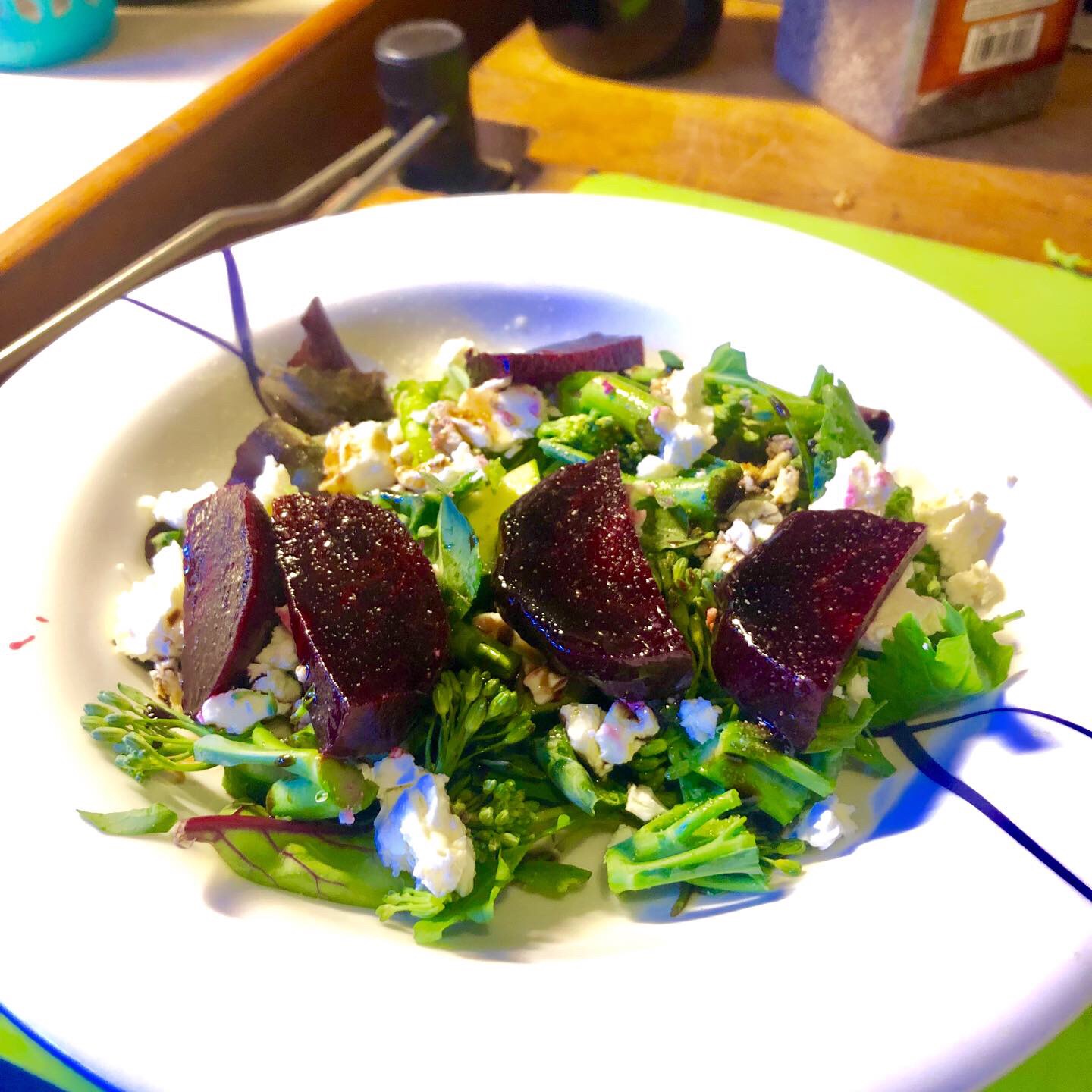
I always understood that diet affects how you feel. It has not been until I have been paid to write articles on gut health that I have come to understand the impact of my food choices. I have written two previous articles on stress and sleep and how they relate to gut health. I found way too many issues that hit close to home. I decided to make a change in our diet and I am hoping to see some good results. I want Dan and I to feel our best as we travel around the world and live life to the fullest. We can’t do that if we don’t feel energetic and well-rested.
Taking my own advice, or advice that I researched and put together because someone else paid me to do it… I hope to see improvements both mentally and physically based on some important research on how food impacts your gut health. Here is my article on food and gut health.
Do you find yourself not feeling your best? Perhaps you have problems digesting food, you lack energy, you don’t sleep well at night, you’re cranky, you get sick way too often. If you know your body is not working as well as it should, it may be time to look at your diet and how it’s impacting your gut health.
If you haven’t already heard about the importance of gut health, Medical News Today describes it as the balance of microorganisms living in your gut. As research continues to uncover more facts about gut health, it turns out that keeping your gut healthy and maintaining the right balance of healthy bacteria is essential for your physical and mental health, sleep patterns, immunity, and so much more.
The bacteria living in your gut is referred to as the gut microbiome or gut flora. There are both good and bad gut bacteria. By putting the right food into your body, you increase the number of good bacteria thus improving the gut microbiome and improving your overall health. Let’s take a closer look at why the food you eat is so important in maintaining a healthy gut, and which foods may be harming your gut bacteria.
Why it’s Important to Eat Healthy
Doctor Ryan Andrews from Precision Nutrition breaks down how important good nutrient is in gut health. With the ease of fast food and packaged meals, it easy to realize how we have gotten away from eating healthy. Unfortunately, with the convenience of fast and easy food, comes the consequence of growing health issues. Almost 70 million people in the U.S. have some type of digestive illness. It may be time to ask yourself, “Am I part of these statistics and what can I do about it?”
While it may be easy to pop a pill to ease the pain, that pill is not addressing the problem. Good gut bacteria allow water and nutrients to enter the body. They also prevent the entry of toxins, viruses, and diseases. Good gut health provides a defensive barrier and allows us to function well. When you don’t feed the good bacteria, that means dangerous compounds are entering your body and your health will begin to decline.
What Goes Wrong When You Don’t Eat Well
When your gut is distressed, it won’t do its job and you won’t feel good. It’s that simple. Your doctor may diagnose you with irritable bowel syndrome (IBS), leaky gut (LG), inflammatory bowel disease (IBD), food sensitivities, celiac disease, or bacterial imbalances. Since gut symptoms can be so complicated, you may not even get a proper diagnosis of the cause of your digestive disorder.
Your good gut health may depend on these three factors:
• Balanced gut flora – your gut contains three to four pounds of bacteria
• Healthy gut mucus – this lining is your protective barrier. It’s so sensitive that it regenerates every three to seven days
• Healthy immune system – 70% of the cells that comprise your immune system live in your gut
Feeding the Good Gut Bacteria
It’s very important that you understand that our gut biome is an everchanging environment. You don’t have a permanent supply of gut bacteria. We constantly need to replenish them, and we do this through diet.
Your specific gut bacteria have been developing since birth. Which bacteria colonized in you depends on whether you were delivered or arrived by C-section, if you were breastfed, and on your mother’s immune system. Since then, your gut bacteria have been influenced by your diet, age, gender, hygiene, medications, and even stress.
Food Revolution Network explains that your current gut environment is dictated by the food you eat. Even if you have developed poor diet habits over the course of your lifetime, the good news is that this can be reversed. Your body is capable of creating new microbiota in just 24 hours simply by changing what you eat.
It’s a well-established fact that healthy gut bacteria are important for good health. The Fruit Doctor on YouTube has a great video on which foods you should be eating to feed your healthy gut bacteria. She gives recommendations on prebiotic foods to include in your quest to build a healthier gut.
The Big Picture in Eating Right

1. Include a wide range of plant-based foods.
2. Eating fiber is key.
3. Stay away from high-processed foods.
4. Get your probiotics and prebiotics.
5. Chose an oil that is good for your gut. Healthline has a great article on how to decide if an oil is safe.
6. Antibiotics kill good bacteria as well as bad bacteria. Make sure to eat food that will help rebuild a healthy microbiome when you are finished taking them.
Food Rich with Good Bugs
A quick recap, probiotics are good gut bugs and prebiotics are food for the good bugs. You can get each of these important components by eating the right kind of food. What are some of the healthiest foods for accomplishing this task? Food Revolution lists some healthy and delicious options you can include in your diet.
Best Greens for Your Gut
Greens are gut spectacular. These all-stars and gut-healthy options come in many shades and flavors. It should be easy to find some that you enjoy eating on a daily basis. Topping the list in the health department are Dandelion greens. This edible weed is great for you.
Not only are Dandelions full of minerals, but they also improve blood lipids, and are packed with inulin, a prebiotic fiber. While they can be bitter, if you sauté them with onions, toss them with your salad, or even drink them as tea, you can reduce potentially damaging bacteria and increase your immune function.
Broccoli has been a fan favorite for many people. Its health benefits are incredible. In 2017 the Journal of Functional Foods completed a study that indicated eating broccoli regularly can improve your intestinal health. Other veggies in the same family such as cauliflower, kale, cabbage, and Brussels sprouts have many of the same benefits.
With so many choices, you are sure to find green favorites to add to your daily diet. Asparagus is great for the gut. You can eat asparagus raw chopped in salads and lightly steamed to increase its benefits. Try some new greens like seaweed. It tastes great and is good for you. Seaweed now comes in sheets to make wraps, is a popular salad, can be used in soup or included in a stir-fry.
Fiber
Fiber comes in two types, soluble and insoluble. You will find soluble fiber, which helps lower blood glucose levels and cholesterol, in oatmeal, fruits, vegetables, and legumes. Insoluble fiber has a cleansing effect on your gut. Include food such as whole grain, kidney beans, as well as colorful fruit and veggies to help with the cleansing process.
Fermented Foods
Fermented foods can be key in fueling a healthy gut. Fermented foods are the live bacteria, probiotic superstars. They feed live microorganisms into your gut which crowd out the bad ones. They not only boost good bacteria but assist with the absorption of minerals and improve your overall health.
Fermentation has been around for thousands of years. Our ancestors fermented to foods in order to preserve them. What they didn’t know, and we now do, is that fermentation adds nutrients to food. The bacteria or yeast added to the food feeds on sugars. This reaction creates probiotics and other helpful compounds.
If you Google fermented foods that are good for your gut, you will discover tons of food choices and recipes you can make at home. Take sauerkraut for example. You can find it in most grocery stores but homemade is easy to make and better for you.
If you have a garden or access to organic vegetables, you can ferment your favorite veggies. It’s quick, easy, and delicious. Other fermented foods you can try are kefir, kimchi, kombucha, and miso.
Tempeh is a fermented soy food that has been eaten for thousands of years and increases healthy bacteria. Restaurants are starting to offer it on their menus and it is becoming more common in stores. Unlike other fermented foods, tempeh should be thoroughly cooked and may taste bitter or bland unless seasoned. Choose organic whenever possible.
Roughage for a Good Gut
Don’t let the term roughage scare you. There are plenty of great tasting foods that will fit the bill. Every heard of Jerusalem artichokes? They don’t look like artichokes and are actually root tubers. They are one of the best foods for gut health and its starchy, slightly sweet, and delicious. The best benefit, however, does come from eating it raw.
Jicama also called a Mexican turnip, is power-packed with fiber. It is excellent for weight loss and regulating blood sugar. It is sweet and crunchy and is a great addition to salads, stir-fries, and smoothies.
Flaxseed may be tiny, but it is tremendous for your gut. It has the highest levels of antioxidants of any food known to man. It contains soluble fiber and can improve digestion and regularity. One note of caution, be sure to grind flaxseed yourself or store ground seeds in the fridge or freezer. It goes rancid very quickly and will be bitter and unpleasant.
Fruit is an excellent source of roughage. Topping the list of “good for you” fruit is bananas. They are brilliant in restoring your gut’s ecosystem. Green apples are high in fiber and boost good gut bacteria. Lastly, you’re probably already a fan of garlic and onions. Keep eating these to boost your creation of good gut microbes.
The Dreaded “Don’t Go There” Food List
Hyperbiotics knows its hard to make good food choices if you are not aware of the negative effects food can have on your body. Here are ten foods that while you may love to eat, top the list of food that disrupt the delicate ecosystem of bacteria that live in your gut.
1. Gluten. There is a good reason there are so many gluten-free options. Try some.
2. Sugar. If the ingredients list includes high fructose corn syrup and artificial sweeteners, put it back.
3. Fried and processed foods. These are one of the quickest ways to destroy your microbiome.
4. Diary. If you have to have it, limit it to a high quality organic and preferably raw dairy.
5. Soy. Most soy is genetically modified which is bad for gut bacteria. Organic can be healthy.
6. Red meat. If you have to have it, limit it and choose organic, grass-fed.
7. Tap water. Get a filter or opt for spring water. Tap water is filled with harmful contaminants.
8. Eggs. Eggs are not bad, it’s all the antibiotics and hormones fed to the chickens. Go organic, free-range.
9. Farmed fish. They are fed growth hormones and GMO corn. Eat wild-caught only.
10. GMO foods. The herbicides and genetic modifications cause severe damage to your gut bacteria.
Making Good Choices for Gut Health
Good gut health all comes down to the food choices you make. Keeping your gut healthy will contribute to better overall health, feeling better physically and mentally, and having an improved immune system. When you make good dietary decisions, you can change the number of healthy microbiomes in your gut.
Changes in your diet should include eating good quality food that is rich in prebiotics and probiotics. It is important that you also get enough sleep and exercise regularly as good food alone is just one key component in keeping a gut healthy. Your body is an interconnected system where the brain and the gut communicate. Ignoring any aspect of your body’s needs will affect the other systems.
Even if your past dietary habits have been less than gut healthy, it’s never too late to restore the balance of the microorganisms that live in your digestive tract. Change your food choices to include green leafy vegetables, fruits, fibers, and foods which will improve your gut microbiome for a happier, healthier you.


